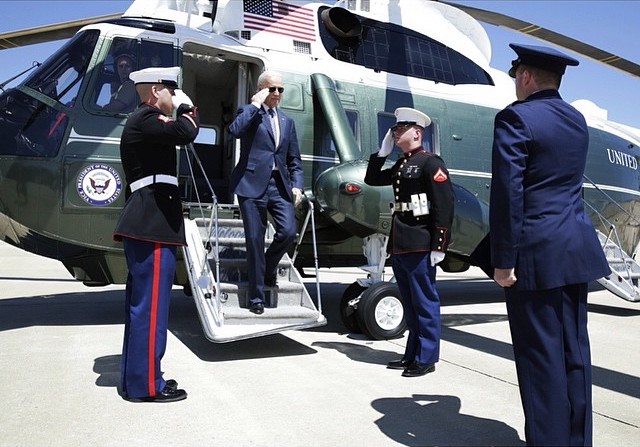A Blueprint for Biden
What Biden needs to do early in his presidency
DAVID LIENEMANN VIA WIKIMEDIA COMMONS
President-elect Joe Biden steps off of Marine One. He has a long list of pressing issues to address once he takes office in January.
December 18, 2020
President-elect Joe Biden will be inaugurated on Wednesday, Jan. 20, 2021. He will face perhaps the most complex set of challenges faced by a president in modern history upon inauguration to the office: a raging pandemic that has claimed over a million lives globally, an economic recession exacerbated by looming unemployment benefits and eviction crises, the urgent threat of climate change, and the need to follow through on promises to combat systemic racism in the United States.
He must — and will — act quickly and decisively on these pressing concerns. Here are some suggestions as to how Biden should start his policy agenda soon after taking office.
First and foremost, he will need to continue to oversee the distribution of the COVID-19 vaccines. This logistically daunting task will likely begin before he takes office, as both the Pfizer and Moderna vaccines are expected to be approved by the Food and Drug Administration this month. However, vaccine availability in December is expected to be very limited and only available to high-priority groups, namely health care workers and high-risk individuals like those who live in assisted living facilities.
Biden understands that working diligently to end the pandemic and fostering a strong economic recovery go hand-in-hand.
Wide distribution to the general public is not likely to happen until the spring of 2021, so the majority of vaccinations in the United States will be administered on Biden’s watch. Biden and his advisers will have to carefully communicate with the leaders of the Trump administration’s “Operation Warp Speed” program, Dr. Moncef Slaoui and Gen. Gustave Perna, to be in the loop on any previous logistical planning for vaccine distribution at this point.
Biden understands that working diligently to end the pandemic and fostering a strong economic recovery go hand-in-hand, so he should also ensure that further economic relief is provided for American families and small businesses still struggling due to the effects of the pandemic. If a stimulus package is not passed before he takes office on Jan. 20, he will have to negotiate with Congress to pass one as soon as possible after he enters office. This stimulus package will also need to include state and local aid. He will also have to oversee further unemployment relief, as well as protections against evictions. Eventually, after the COVID-19 pandemic subsides, Biden will have to focus on a fairer and more equitable system of tax reform.
After four years of largely isolationist foreign policy from Trump, Biden will have to significantly repair America’s reputation within the global community as a whole after the damage done by the Trump administration. He will need to live up to his promises and immediately reenter the Paris Climate Agreement on day one of his presidency, advocate for bold legislation to reduce carbon emissions and ensure cleaner water and air. He should consider holding a climate summit with international partners during the first year of his presidency; such a summit could not only resolve but also strengthen the standards established in the Paris Accord. Biden will also have to work with the global community in a way largely ignored by the Trump administration. With the COVID-19 pandemic still devastating many parts of the world, this will mean rejoining and actively working with the World Health Organization.
The challenges that will be faced in the near future are daunting and difficult, but they are not insurmountable with steady leadership and a commitment to truth, decency and expertise.













